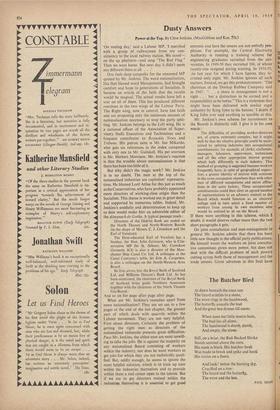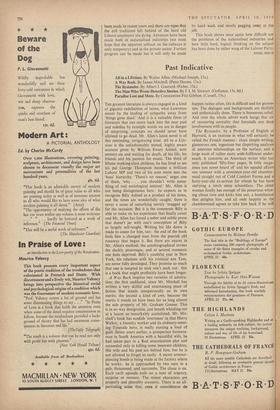Dusty Answers
'ON vesting day,' said a Labour MP, 'I marched with a group of railwaymen from my con-
stituency to the local railway station. We stood—. on the up platform—and sang "The Red Flag." Then we went home. But next day it didn't seem any different there at all. . .
One feels deep sympathy for the unnamed MP quoted by Mr. Jenkins. The word nationalisation, like that blessed word Mesopotamia, had brought comfort and hope to generations of Socialists. It became an article of the faith that the results would be magical. The actual results have left a scar on all of them. This has produced different reactions in the two wings of the Labour Party. The Right wing, now in control, have lost faith and are proposing only the minimum amount of nationalisation necessary to stop the party split- ting. Mr. Jenkins belongs to the Left wing. He is a national officer of the Association of Super- visory Staffs Executives and Technicians and a frequent contributor to Reynolds News and Tribune. His patron saint is Mr. Ian Mikardo, who gets six references in the index compared with only one to Mr. Gaitskell. His pet aversion is Mr. Herbert Morrison. Mr. Jenkins's reaction is that the trouble about nationalisation is that there has been too little of it.
But why didn't the magic work? Mr. Jenkins is in no doubt. The men at the top of the nationalised industries are capitalists' representa- tives. He blamed Lord Attlee for this just as much astheConservatives, who have probably appointed more directors of working-class origin than the Socialists. This theme is worked out in great detail and supported by numerous tables. Indeed, Mr. Jenkins's assiduity and determination to keep pp to date would make him an admirable editor of the Almanach de Gotha. A typical passage reads : Directors of the District Bank are seated on
the North Thames and North-Western Boards (in the shape of Messrs. C. J. Cronshaw and the Earl of Verulam).
The Eton-educated Earl of Verulam has a brother, the Hon. John Grimston, who is Con- servative MP for St. Albans; Mr. Cronshaw (formerly ICI) is also a director of the Man- chester Ship Canal Co. Ltd. A colleague at the Canal Company's table, Sir Eric A. Carpenter, is also a colleague on the North-Western Area Board.
Sir Eric serves, too, the Royal Bank of Scotland Ltd. and Williams Deacon's Bank Ltd. As has been mentioned, the chairman of the Royal Bank of Scotland helps guide Northern Assurance together with the chairman of the North Thames Gas Board.
And so on for page after page after page.
What are Mr. Jenkins's remedies apart from more nationalisation? They are set out in a few pages at the end of the last chapter, the greater part of which deals with quarrels within the Labour movement. They are not very helpful. First about directors. Certainly the problem of getting the right men • as directors of the nationalised industries presents great difficulties. Pace Mr. Jenkins, the ablest men are most unwill- ing to take the jobs. He is against the majority on any nationalised Board consisting of workers within the industry, nor does he want workers to get jobs for which they are not technically quali- fied. But, oddly' enough, he seems to ignore the most helpful solution, which is to train up men within the industries themselves and to provide within them a real career open to the talents. But if we are to get directors trained within the industries themselves it is essential to get good entrants and here the omens are not entirely pro- pitious. For example, the Central Electricity Authority is running a training scheme for engineering graduates recruited from the uni- versities. In 1949-50 they recruited 104, of whom twenty-one resigned during training. In 1954-55, he last' year for which I have figures, they re- cruited only eight. Mr. Jenkins ignores all such matters. Instead, we get this pronouncement : 'The chairman of the Dunlop Rubber Company said in 1947: ". . . a share in management is not a right . . . but a distinction to be earned and a responsibility to be borne." This is a statement that might have been delivered with similar regal authority by King John to his barons.' I doubt if King John ever said anything as sensible as this.
Mr. Jenkins's own scheme for recruitment to the Boards is distinctly odd. I give it in his own words :
The difficulties of providing worker-directors arc, of course extremely complex, but it might well be that the elective principle could be main- tained by splitting industries into occupational constituencies; for example, of clerks, craftsmen, managers, labourers, supervisors, technicians and all the other appropriate interest groups which bulk differently in each industry. This method of grouping is suggested because workers frequently have, in spite of geographical separa- tion, a greater identity of interest with someone in the same occupation elsewhere than with other men of different occupations and union affilia- tions in the same factory. These occupational constituencies could then elect an agreed number of representatives to an advisory council to the Board which would function as an electoral college and in turn select a fixed number of workers from among its own members who would he entitled to sit on the Board.
If there were anything in this scheme, which I doubt,. it would deserve rather more than the two short paragraphs it gets.
On joint consultation and man-management in general Mr. Jenkins admits that there has been little new thought in the official party publications. He himself wants the workers on joint consulta- tive committees given more power, but does not deal with the difficult problem of such powers cutting across both those of management and the trade unions. Great advances in this field have
been made in recent years and there are signs that the evil traditions left behind of the hard old Liberal employers are dying. Advances have been made both in nationalised industries (we must hope that the apparent setback on the railways is only temporary) and in the private sector. Further progress can be made but it will only be made by hard work and steady pegging away at the job.
This book shows once again how difficult are the problems of the nationalised industries and how little hard, logical thinking on the subject has been done by either wing of the Labour Party.
NIGEL BIRCH















































 Previous page
Previous page